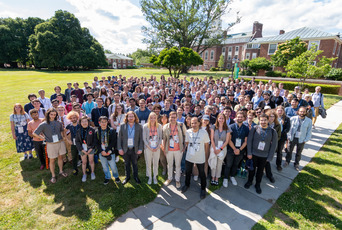
PiTP 2024 Probes the Gap Between Classical and Quantum
Imagine a world where the strange and fascinating rules of quantum physics, usually only seen at the tiniest scales, suddenly apply to objects that we can actually see. This is the essence of ultra-quantum matter (UQM).
UQM was the subject of the 2024 Prospects in Theoretical Physics (PiTP) program. This year, the program was organized in partnership with the Princeton Center for Complex Materials (PCCM) at Princeton University. The collaboration resulted in an intensive three-week summer workshop for advanced graduate students and postdoctoral scholars, held from July 8–26. The program brought 213 participants from over 20 countries to the IAS campus.
But what is ultra-quantum matter? In our everyday world, classical physics describes how objects behave. For instance, a ball rolls down an incline plane in a predictable way, and a mug of coffee stays put when placed on a table. But in the quantum world of atoms and subatomic particles, particles can be in two places at once, or instantly affect each other across great distances. In the right circumstances, these quantum aspects can extend to macroscopic matter. It is these phenomena that ultra-quantum matter theory describes. UQM can also have characteristics that neither classical matter nor individual quantum particles possess, like unusual ways of conducting electricity or storing information.

Ultra-quantum matter is an active and vibrant field of scientific inquiry, with many scholars working towards developing techniques to create these states in laboratory settings. While much of the current work remains theoretical, the potential applications of UQM are tantalizing. Advances in this field could lead to significant breakthroughs in quantum computing and the development of innovative electronic devices.

The complexity of UQM research necessitates collaboration among many diverse branches of physics. Accordingly, the lecturers at PiTP 2024 included experts in condensed matter theory, but also those working on quantum computation, quantum field theory, and string theory and nuclear physics.
Nathan Seiberg, Charles Simonyi Professor in the School of Natural Sciences, organized the program alongside Michael Hermele of the University of Colorado, Ashvin Vishwanath of Harvard University, and Biao Lian, Leslie Schoop, Sanfeng Wu, and Ali Yazdani, all of Princeton University.
Many of the lectures from the 2024 PiTP program are available to view via the PiTP 2024 IAS YouTube playlist. A playlist of videos from the 2024 PCCM Summer School is also available.


